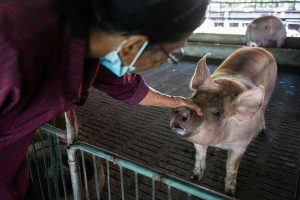THE Department of Agriculture (DA) said it will start vaccinating hogs against African Swine Fever (ASF) by Friday, beginning in Batangas, which has reported significant new outbreaks.
“We’re going to implement the vaccination this Friday in Lobo, Batangas para magsimula na ’yung treatment ng mga dumadaming cases of ASF (to begin addressing the increase in ASF cases),” Agriculture Assistant Secretary for Poultry and Swine Constance J. Palabrica told reporters on Tuesday.
He added that the increase in ASF cases may have been caused by rainy weather, causing the disease to spread via the water supply.
“We expected that because of the rains, (ASF) has spread to areas that were previously negative,” Mr. Palabrica said.
As of Aug. 21, 115 municipalities had active ASF cases across 32 provinces, according to the Bureau of Animal Industry. There were 64 affected municipalities as of Aug. 8.
He added that culled hogs should be buried at least 10 feet below ground and covered with plastic to prevent the spread of the virus when it rains.
“(The burial spot) needs to be covered to prevent ASF from entering the water system… It could hit the water table, and the disease can spread there,” he said.
In a separate briefing, Agriculture Assistant Secretary and Spokesperson Arnel V. de Mesa said that an initial 2,000 doses of the first batch of 10,000 will be used on Batangas hogs.
“We will start in Batangas and then eventually in Quezon. If the results are okay, then we’ll move around to other areas,” Mr. De Mesa added.
The DA has initially procured 10,000 doses of the vaccine after the surge in cases in Batangas. It has allocated P350 million for 600,000 vaccine doses for the broader roll out.
The Food and Drug Administration granted a Certificate of Product Registration for the AVAC ASF Live Vaccine from Vietnam to conduct controlled DA-led trials.
He said one other factor that may have contributed to the spread was the transport of infected hogs for sale at low prices, giving the farmers at least some income in lieu of taking a loss in a hog cull.
The DA has set up checkpoints to monitor the movement of hogs outside active ASF areas.
“The vaccine is just one of the many tools available to us. So, biosecurity, border control, our repopulation program, of course, and our information dissemination are also important,” Mr. De Mesa said.
The DA has also raised the indemnification rate to P4,000 for piglets, P8,000 for medium-sized hogs, and P12,000 for sows and large hogs that have to be culled. The maximum indemnification was previously P5,000 per animal. — Adrian H. Halili

